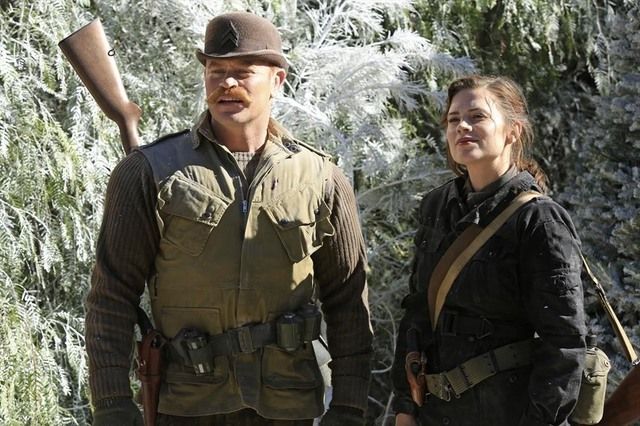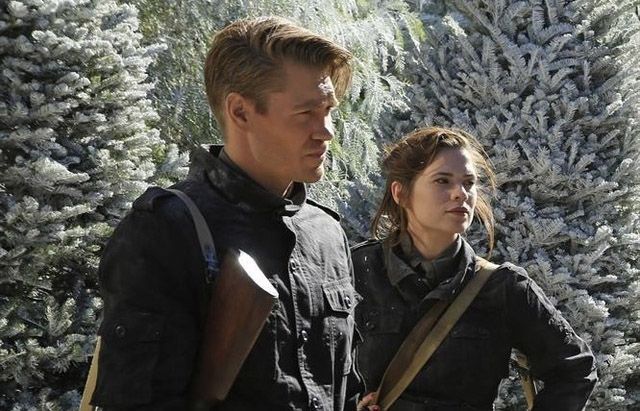While some other comic book dramas focus entirely on the lives of their famed heroes, Marvel's Agent Carter told a different kind of origin story this week.
It begins its path in the Red Room. The Soviet training ground for the woman who would become the Black Widow isn't mentioned by name, but fandom all but pinned down the location before the opening scene of “The Iron Ceiling.” Still, that flashback beginning reveals much about how the show views itself. Opening in 1937, we see a sinister kind of schooling being given to Russian girls that ranges from memorizing American accents from Disney's Snow White to Battle Royale-style competitions in the courtyard. While the action is restrained by the broadcast network standard – all foley work and quick cuts rather than blood and broken bones – the final fight between two pre-teen girls who once shared a much-needed crust of bread caps off the disturbing sequence in brutal, murderous fashion.
Zipping forward to the show's present day of 1947, we meet "Dottie." Peggy's flighty neighbor is the picture of America by day, but at night she still handcuffs herself to her bed for the comforts of the Red Room's homier qualities. And even in a flaky "What's the real New York?" conversation with Agent Carter, the Soviet spy is truly an ice-cold operator as she steals away Peggy's apartment keys for her own nefarious purposes.
But really Dottie's story is one to let simmer. The promised action of the episode is all about the S.S.R.'s latest lead on Howard Stark. His possibly traitorous deals point a big red arrow to Russia, and that leaves Peggy once again in the enviable position of fighting her way into a real mission – one for which her code-breaking and language skills make her a natural fit. In perhaps the most telling character moment yet, Agent Carter spurns Edwin Jarvis and her fling with being a double agent, promising that if the men of her agency won't give her the respect she deserves, she'll make them.
That's the theme that runs throughout the rest of the hour: characters who decide to make themselves into something more. While much of Agent Carter up to this point has been all about the societal conventions of the 1940s and how they repeatedly marginalized women, this episode takes a welcome leap forward by putting the focus on how Peggy views herself. If her mission is her own and the respect she earns its own reward, the character has a chance to win our hearts and applause even as we know any victory she makes will be short-lived.
A well-placed call from Peggy places her on the deep-undercover mission to Russia despite the protests of the jocular Agent Jack Thompson by calling in her War-era team the Howling Commandos to provide cover. Entrenched in missions, Dum Dum Duggan and company provide Peggy the rep and a feeling of belonging she's been robbed of since coming home. But more importantly for the viewers, they provide a sense of fun and a connection to the broader Marvel Cinematic Universe that is this kind of show's stock in trade. As Carter and her team make their way to the Soviet site that supposedly holds the secrets of Stark's defection, the camaraderie that bubbles up is both genuine and telling. The more we see Peggy as "one of the boys," the more we start to view Thompson as a square peg in the muscular military world he plays up to in the office.
Speaking of the office, the episode advances its character arcs in more ways than on the battlefield this week. While Chief Dooley has been the most consistent voice in pillorying Stark as a traitor, a series of clues provided by a newspaper pal starts to introduce doubts as to whether the playboy could actually sell his wares to America's enemies. But in an even more welcome twist, nice-guy Agent Sousa starts to see his own investigation into the blonde double agent of the pilot pay off with Peggy as the (correct) prime suspect. Each character pivots from the one-dimensional stock features here and toward a more nuanced way of looking at the spy world of the series, to the show's credit.
Layers are added to Thompson as well, as a late-night drinking session lets him reveal his claim to fame from the War: killing the half-dozen Japanese agents who had sneaked into his camp. The matter-of-fact way he relates the story to the Howling Commandos underlines Thompson's regrets, and for a moment humanizes the so-far stone-faced operative to Peggy. By the time the team infiltrates the Russian site, little of that matters. Between a stab-happy tween and waves of Russian soldiers shooting their way through the Commandos, the wrap of the show is all action except for Thompson, who freezes as badly as that guy in Saving Private Ryan. Luckily, Peggy morphs into full badass mode, helping the team save the psychiatrist of the man who was trying to rebuild Stark weapons from Howard's old blueprints.
If that last sentence wasn't indication enough, the show has leaned fully into "Stark is exonerated" territory brought on at least partly by the limited schedule of actor Dominic Cooper. But as with so many things Agent Carter, the little details that could stand out as sore spots are easily ignored in the face of moments like Thompson's last-minute admission that the men he killed in Japan were ready to surrender – a fact he didn't realize until after the trigger had been pulled, and which he subsequently hid from his superiors.
In the end, from Peggy to Thompson and from Dooley to Dottie, the players of Agent Carter are pushing against the narratives set for them and forging their own arcs as the season progresses. That sense of origin – not in the "story behind the story" sense but in the true forging of compelling people sense – makes for one of the more effective and progressive shows of the new superhero TV Age.



